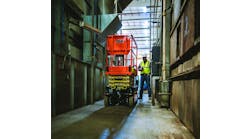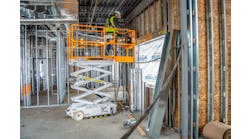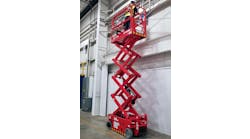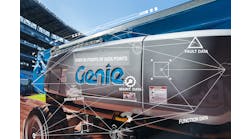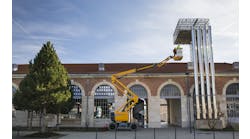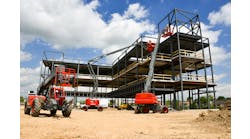Coming from the airline industry, where lack of attention to customer safety could result in hundreds of deaths at a time, Andy Studdert, chairman and CEO of Deerfield, Ill.-based NES Rentals, has some strong views about the importance of safety and has recently been awarded for it. He was honored by the International Powered Access Federation as Safety Champion of the Year in April and in February the National Safety Council recognized Studdert on its annual list of “CEOs Who Get It” for incorporating safety as a core value, cultivating safety leadership at all levels within an organization. RER's Michael Roth recently spoke with Studdert about NES' safety program as well as his thoughts on the economy and the future of the rental industry.
RER: You've received two prestigious safety awards on behalf of NES. Tell me about your safety programs at NES and how this emphasis developed?
Studdert: Safety awards are a very important reflection on what we have done here at NES over the past five years to turn us into a world-class operator. And when you're a world-class operator the first thing you do is make sure your people and your customers are safe.
You told me a while back you were putting more emphasis on safety and now you've done it and been recognized for it. Tell me about what you did to put safety into the forefront.
First of all, the CEO and the entire management team have to set a tone at the top. That manifests itself in talking about it in every forum that you have. If I walk into a branch and there is something that is unsafe, I call it out not in a mean way but right there. The officers and all the people visiting that branch help that branch manager see what his facility looks like. When you have an accident, you have an immediate review by safety professionals and management.
We've established a very professional safety and environmental group inside the company and they perform annual safety and environmental audits of the branch and if the branch manager gets below a passing score, he's put on a program where he must remediate that or it has a significant impact on his compensation. So we've tied it in both from a cultural and a compensation standpoint, and we've carried it out to our customers as well.
There's a misconception in many industries and ours is included that it costs money to be safe. Actually a safe company is an efficient company, both in the short term and the long term and it's really a dangerous mindset to have the thought that safety costs you more, but it's the exact opposite.
All you have to do is look at how it affects insurance premiums and the extra expense is right there.
That's right. And if you think about another example of that, many would argue that doing annual inspections and keeping current on service bulletins for the manufacturers costs you money, actually we would say we are current on all of our service bulletins and all of our annual inspections and that makes our fleet more reliable and safer and our customer looks at us as a high-quality provider. And in the long run it's a more efficient fleet.
NES rents a lot to the industrial marketplace and many of those customers demand documentation of your safety record, don't they?
Yes, they want to look at our safety record and they want to look at our culture. They want to know that our senior management team believes in safety. They want to see our drivers show up and go through a structured process to load and unload the equipment. They want to make sure that the safety equipment is on the individual equipment, fire extinguishers are current, annual inspections are current, everything is up to snuff.
Does some of your interest in this come from your background in the airline industry where obviously a lack of safety can result in hundreds of deaths at the same time?
It would be hard for me to say I didn't understand the importance of safety having moved 300,000 people a day at what was, at that time, the world's largest airline. A large number of our management team also came out of the airline business so safety is second nature. It's like doing the dishes. If you don't do the dishes how can you say you're keeping your house up?
As far as internal practices, do you have meetings at each branch, and are there other safety procedures?
Continue on Page 2There are safety meetings on a regular basis, and there is also safety training. We have an internal education system that everybody must stay current on. Also, during the safety and environmental audits all of those procedures are reviewed, and all the training logs are checked. I can stand on top of the company and demand all of this, but if it's not pulled by the employees through the company then it doesn't stick. And we encourage all of our employees to stand up, if they see something that's unsafe or questionable, to stop it, or to tell their supervisor.
It sounds as though you have been impressed with the commitment throughout the company.
Absolutely. And they know that my goal is that they get home safe every day. And that plays extremely well when they know that it may take an extra step to be safe but they get to go home.
How about ensuring that the customer is operating the equipment safely? That's another aspect that can't be taken lightly.
We ensure that there is familiarization training given by qualified people. We also offer training courses to our customers on a regular basis. We just did a 3-day training session with all of the field employees of one the largest contractors in the country, where our safety professionals did the training. I think it's an important issue for us in the rental industry to work with the manufacturers and our customers to come up with a more structured safety training and licensing procedure. That's something that we as an industry should take a leadership role on.
You've worked closely with IPAF?
Yes. But I [don't get involved in] what the standard is — it's just that we need a standard.
I tell the story that probably the most shocked I was when I joined this industry was that if I wanted to rent you a 135-foot boom, I could do that, but if I wanted to rent you a Ford F150 pickup truck, I have to see your license.
If people have to decide whether or not safety should be a focus, then you know that they don't understand. It has to be. And every CEO in our industry has to make it their personal top priority to ensure the safety of their customers and their employees, and if they don't they aren't doing their job.
You've cut down considerably on lost-time accidents and delivery accidents?
We made sure all our height bars are in place when you leave a branch so you make sure you loaded it properly. Every truck driver has a measuring device in their truck and they are required to measure their load before they leave a site for pickup. They have all been trained on that specifically. So we have both protection in and out for the height to make sure we don't hit anything. Since we installed that procedure four years ago, we've had a very strong performance.
Do you have a team responsible for safety?
I have a safety, health and environmental staff, which is run by director of environmental, health and safety Teresa Kee, who we brought in from outside the industry. She, along with five people, are responsible for the oversight of the procedures and the structure. But every branch manager, every district manager, every vice president in this company is responsible for safety. There's no finger-pointing here.
Talking about overall business, how does the economy look over the next year?
We, like all the other companies that have made public comments, are having a challenging beginning of the year. Rates are down from 4 to 7 percent, we've got utilization down 9 to 14, but our mix is strong, some of our branches are actually ahead of last year. We have a strong presence in Michigan supporting the auto industry, so we're getting a disproportionate hit on that. But we've got a good mix of industrial to non-residential construction. No exposure to residential construction. We just got our latest customer satisfaction survey and it's the highest it's ever been.
You converted the fleet to a higher percentage of aerial?
It's north of 90 percent aerial now.
You made that strategic shift and then you got hit with this recession where that area is the hardest hit. Not backtracking or changing that emphasis?
No, not at all. We consider ourselves to be the pre-eminent provider of aerial lifts in the country. But we're not just sitting here watching the numbers go down, we've reduced manpower by 20 percent, we've taken costs out at all levels of the company, we've reduced layers of management, all of our branches are contributing to the bottom line so it's fasten your seat belt time. But we're not sacrificing safety or customer service.
Continue on Page 3
Have you cut sales staff?
No, that's the last thing you do. We have our normal attrition but our sales force is roughly the same size as it's been the last two years.
Are there any areas of the country that are fairly solid where prospects look pretty good for this year?
We continue to see positive signs coming out of the Gulf and the mid-South. We see glimmers in our eastern branches. Site specific we've still got some very large construction going on, some pharmaceutical and retail space continues to grow in some pockets. There is business out there, we just have to keep chasing it and hope our competitors do the best they can on staying rational on pricing.
Any sense of how long it will take to turn this economy around?
I think what we've seen in the last month is kind of a bottoming out, hitting bottom on the pricing and utilization trend. We're seeing both a seasonal uptick and in some of our warm markets, some return to normalcy, so we're hoping that's not a false spring. We see — like many economists — a recovery in the out part of this year or early next year but it will be a slow climb back. We think with the lack of new equipment being manufactured and the continued reduction in fleet sizes by many of our competitors, we think as we get some growth back we'll see some return to rational pricing and utilizations.
How much did you reduce your size of fleet?
We're probably down 3 to 5 percent in fleet size, but we're reducing our variable costs and keeping our powder dry for the turnaround. We're doing the normal amount of fleet sales that we'd be doing at this time of the year.
Did NES age its fleet significantly?
No, we had a pretty good capex spend last year. The fleet that we have sold this year has been older, so I'd say we'd probably be about the same.
We know NES' volume is down but is profitability down comparably?
We're private, so we're not going to go say too much. But I would say we're not struggling as mightily as are some of the public companies. I guess the way to give you a non-number answer is we're ahead of our plan for the year for the first quarter.
